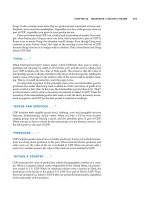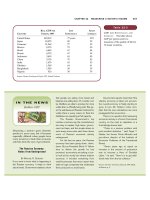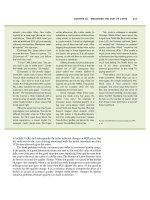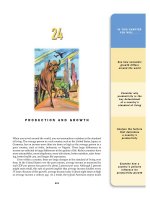Ten principles of economics
Bạn đang xem bản rút gọn của tài liệu. Xem và tải ngay bản đầy đủ của tài liệu tại đây (238.75 KB, 16 trang )
Ten Principles of
Economics
Chapter 1
Economy. . .
. . . The word economy comes from a
Greek word for “one who manages a
household.”
.
Society and Scarce Resources:
✔The
management of society’s
resources is important because
resources are scarce.
✔Scarcity implies choice and choice
implies cost.
.
Scarcity . . .
. . . means that society has limited
resources and therefore cannot
produce all the goods and services
people wish to have.
.
Economics
Economics is the study of how
society manages its scarce
resources.
.
Economists study. . .
◆ How
people make decisions.
◆ How
people interact with each other.
◆ The
forces and trends that affect the
economy as a whole.
.
Ten Principles of Economics
How People Make Decisions
1. People face tradeoffs.
2. The cost of something is what you give
up to get it.
3. Rational people think at the margin.
4. People respond to incentives.
.
Ten Principles of Economics
How People Interact
5. Trade can make everyone better off.
6. Markets are usually a good way to
organize economic activity.
7. Governments can sometimes improve
economic outcomes.
.
Ten Principles of Economics
How the Economy as a Whole Works
8. The standard of living depends on a
country’s production.
9. Prices rise when the government prints
too much money.
10. Society faces a short-run tradeoff
between inflation and unemployment.
.
.
Allocation Problems
Each society, no matter how large or how
organized it is, has to consider and solve the
following ‘fundamental economic problems’:
1.
What to produce and how many units?
(More rice or more cars, more universities or more environmental
commodities)
2. How to produce these commodities?
(labor-incentive, capital-intensive or environmental-intensive
production?)
3. For whom to produce these commodities?
(Who shall have access to these commodities – Distribution Problem?)
.
.
Microeconomics and
Macroeconomics
◆ Microeconomics
focuses on the individual
parts of the economy.
◆
How households and firms make decisions and
how they interact in specific markets
◆ Macroeconomics
looks at the economy as a
whole.
◆
How the markets, as a whole, interact at the
national level.
.
The Production Possibilities
Frontier
•Shows the various combinations of two
goods that can be produced by one firm.
•Assumes two goods
•Assumes fixed technology and fixed
factors of production.
.
The Production
Possibilities Frontier
Quantity
of Computers
Produced
4,000
An outward shift
in the production
possibilities
frontier
3,000
E
2,100
2,000
A
700
0
.
750
Increase in
technology to
produce
computers.
1,000
Quantity of
Cars Produced
Concepts Illustrated by the
Production Possibilities Frontier
◆ Efficiency
◆ Tradeoffs
◆ Opportunity
Cost
◆ Economic Growth
.









